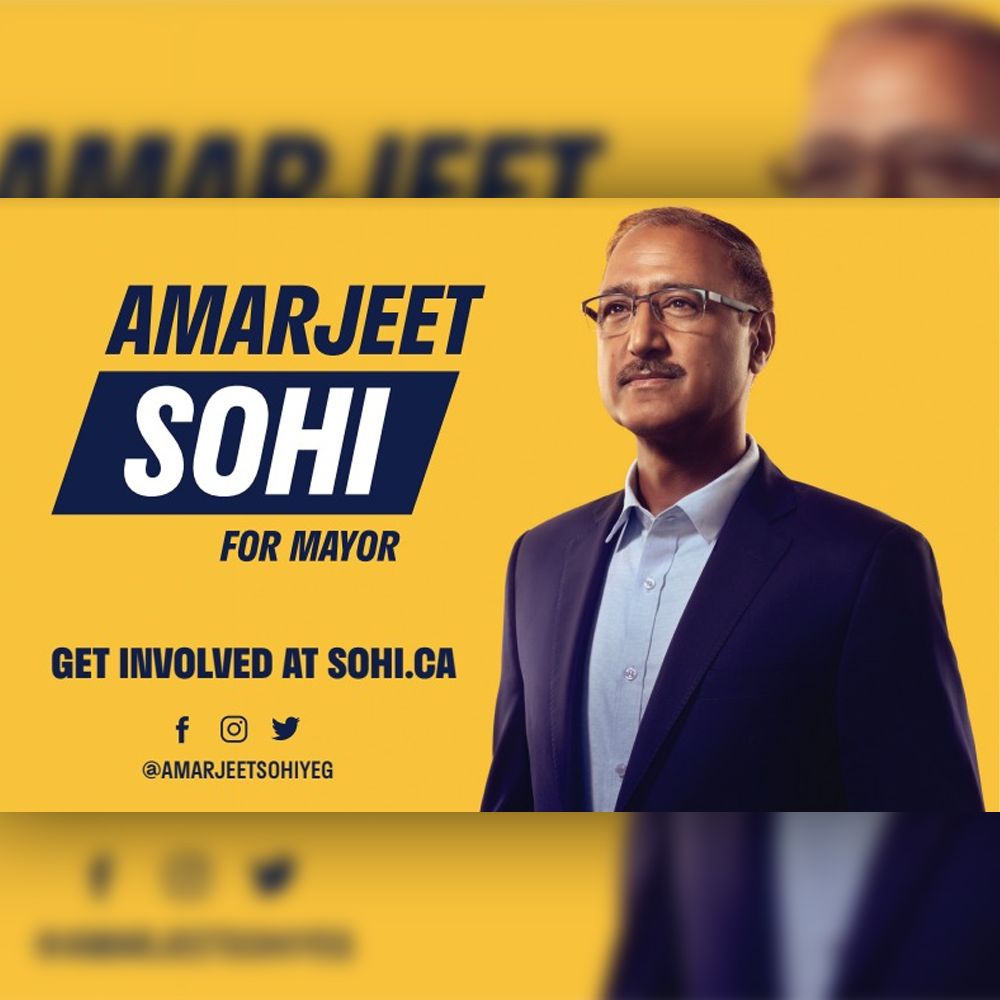
A Conversation with Mr Amarjeet Sohi
We have interacted with Mr Sohi several times.
On each occasion, he insists that we call him “Amarjeet”. We prefer to call him Mr. Sohi. Mr. Sohi has run a kind, compassionate and well thought through campaign. He has a big profile, yet he makes the time to return phone calls and emails. One thing is clear. If Mr Sohi wins this election, he will FIGHT for little people. LCCMedia sent some questions to Mr Sohi’s campaign. Here is what they sent back.
Please tell us a little about you.
I’ve worked on the front lines of Edmonton’s public service as a bus driver. I’ve been a union organizer, and I’ve volunteered on stage productions. My work at Edmonton Transit is what compelled me to become a city councillor in 2007. With 8 years of experience on council, I understand the interplay between City Council and City Administration.
I also earned a lot of experience when I was a Member of Parliament for Edmonton Mill Woods. I served both as Minister of Infrastructure and Communities, and Minister of Natural Resources. In both of those roles I worked with communities all over Canada, and other orders of government to help build infrastructure and responsibly develop our natural resources. That work required a lot of negotiation, discussion, planning and leadership, which are all qualities that are needed from someone in the mayor’s chair.
Why are you running to be the Mayor of Edmonton?
I love this city. Edmonton has given me so many opportunities since I immigrated here from India. I’ve worked in the public service, I’ve been part of sports teams and arts organizations. I really believe in giving back to this place. It’s why I served as a city councillor from 2007 to 2015, and then as a federal minister from 2015 to 2019. But my story isn’t that unique. There are thousands of people in this city with similar experiences. And not all of them have had the same opportunities as me. I want to help those people succeed in Edmonton, as I have. And through my years of experience, I’ve developed the leadership skills, the knowledge and the temperament needed to be the city’s mayor.
Can you describe your top priorities for Edmonton? Homelessness is a big problem in Edmonton. What are your plans to tackle it?
My policies really reflect where I think the biggest issues facing the city are, and they include:
Economic Development: how can we rebuild an economy coming out of the COVID-19 pandemic that balances supporting businesses, and making sure there are economic opportunities and benefits for everyone?
Environment, Energy Transition and Climate Change: we can’t wait any longer to enact policies that will mitigate climate change. It’s here, we’re experiencing it right now. I’m looking at policies that encourage transitioning away from fossil fuels, and protect our parks and river valley.
Arts & Culture: We can’t have a vibrant city without arts and culture. These industries were decimated by COVID. It’s our responsibility as a community to lift up and support arts and culture events and organizations.
Public Services: We need to protect and enhance quality public services. These are the basics that citizens expect: good public transit, access to recreation, libraries and other services. We need to find ways to deliver these more efficiently without cutting the services that Edmontonians depend on.
Social Supports: The pandemic has revealed a lot of the cracks in our systems of support for vulnerable people. We’ve seen increases in people without homes, we’ve seen the elimination of safe consumption sites affecting drug use in our communities. We need to do better here. And this requires all orders of government working together toward the same goals.
We can’t have full economic recovery when people are struggling with addictions, homelessness, or mental health challenges, nor when people are held back by inequity. Threats to our environment undermine economic growth and our quality of life.
Homelessness is a significant issue. We have made progress as a community over the past 12 years, helping thousands of Edmontonians find homes through Housing First and other programs.
We need more resources, particularly for permanent supportive housing, and as Mayor I will advocate to and work with the federal and provincial governments to secure these. We also need to address issues that cause people to lose their homes—everything from affordability of housing, to addictions, and mental health challenges. I will also work with community members and organizations to ensure there aren’t people falling through the gaps with our existing programs.
We have a plan that we know has worked. We need the resources and the will to complete the job.
What are the strengths you bring to the office?
I think that my greatest strength is my leadership style: I am a collaborator and consensus-builder. If there’s one thing I have learned in my career, it’s that we ca get much further when we go together. A mayor is just one vote on council, but by bringing councillors together around common interests, and by truly listening and engaging with those who disagree with us, I’ve found that we can accomplish great things. That was the approach I took to consulting with Indigenous communities to get the Transmountain Pipeline expansion approved, and that’s the approach I will take at city hall.
How do you intend to ensure that you are inclusive?
My leadership style is one of inclusivity. As Mayor, I would listen to all voices and perspectives before making decisions, as I have throughout my time as a Councillor and an MP and federal cabinet minister.
Bringing people together is what I do. We also need to recognize that not everyone has benefitted when things have gone well, and our community can only succeed when no one is left behind. For many people, systemic inequities and barriers are a big reason for that, and we need to fix that. Applying an equity lens to decision-making is a way to start.
We are facing significant challenges, and the only way we can address them is by working together as a community.
Can you describe your plan for women and children?
We need to acknowledge that the pandemic has disproportionately affected women, particularly in the workforce. Children have also been adversely affected, and we have to make sure that they don’t suffer lingering mental health challenges or developmental issues.
While out of the city’s jurisdiction, we can be a partner in facilitating more child care opportunities by using city spaces to partner with child care providers.
The creation of WAVE was a positive step, and we need to ensure it is properly supported and can continue to fulfill its role. We need to support families, and that includes making sure City services, from rec centres to libraries, are affordable and accessible.
Hate-based violence, particularly against women of colour, is on the rise. I’ve committed to a 100-day plan to work with the community to come up with solutions to begin to tackle race-based and hate-based violence.
How important is climate change and what will you do to make sure climate justice is at the forefront your agenda?
We are living in a climate emergency and need to address it with that level of seriousness.
We have already seen and felt the impact of climate change, especially this past summer with extreme heat and smoke. Climate change will impact everything we do, from how we get around, to the weather we experience.
I have released policy on how I intend to take action on climate change: energy transition, the 15-minute city (living within our communities), the natural environment, and the built environment. You can read more on my website at sohi.ca/climate.
My plans include creating more natural spaces and parks, supporting infrastructure that allows us to live more locally, transitioning the City’s fleet to zero-emission vehicles, supporting hydrogen and other clean energy industries, and creating a retrofit accelerator that will support home and building owners in making their spaces more energy efficient and environmentally friendly.
What books inform your knowledge?
One that has had a big influence on me over the last few years is Ibram X. Kendi’s How to Be an Antiracist. It encourages all of us to move from sympathy to action, and reminds us that to build an inclusive society, we have to act to mitigate the disproportionate impacts of historical trauma and of current policy.
Where can we learn more about you and your campaign?
Campaign Email address: info@sohi.ca
Website URL: sohi.ca
Facebook: Amarjeet Sohi (https://www.facebook.com/
Twitter: @amarjeetsohiyeg
TikTok: @amarjeetsohiyeg
Linkedin: Amarjeet Sohi (https://www.linkedin.com/in/





